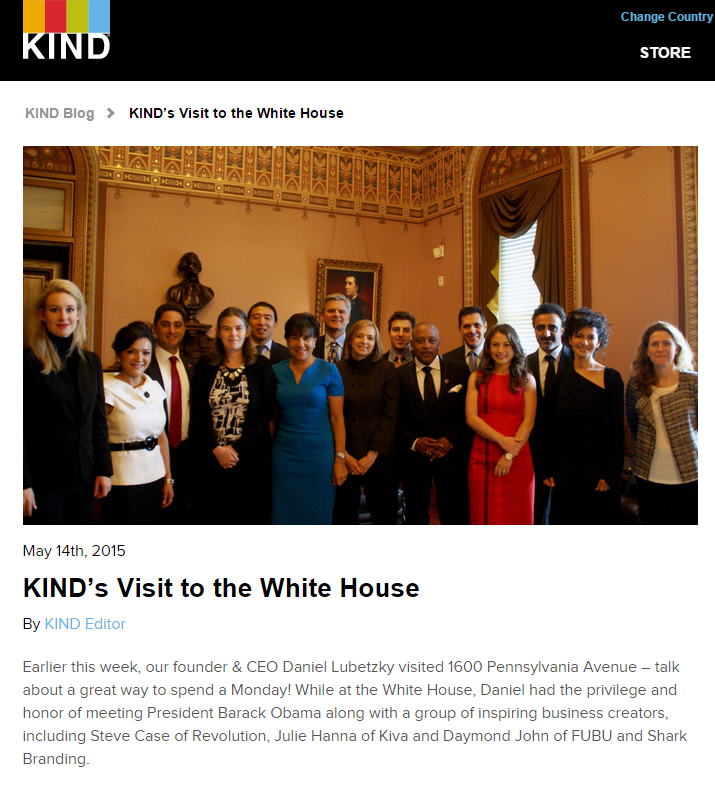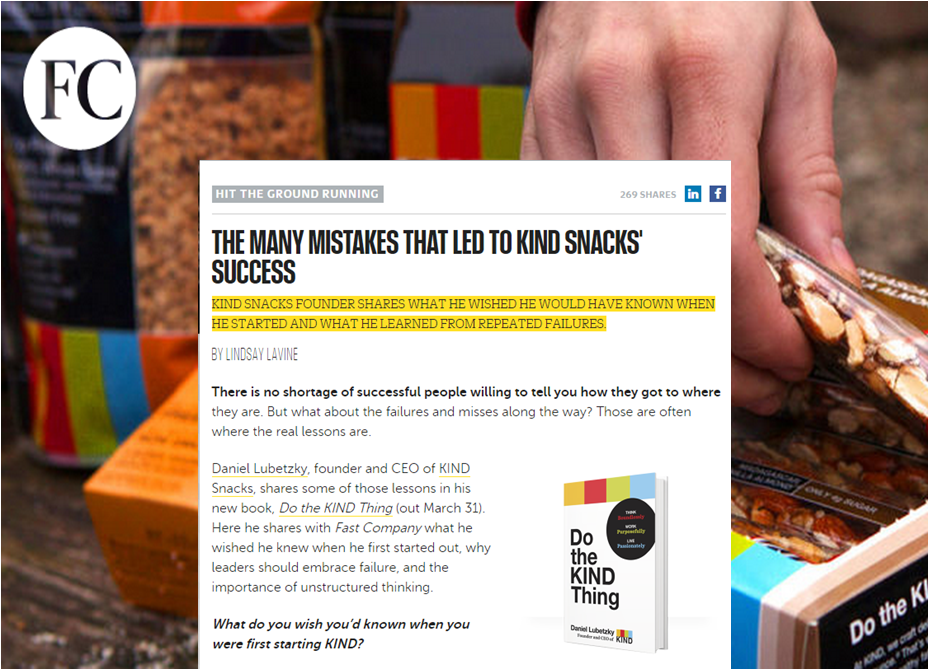Archive for the ‘Entrepreneurship and Management’ Category
KIND’s Visit to the White House
Published under Entrepreneurship and Management, KIND Snacks, Leadership May 14, 2015On the many mistakes that led to KIND Snacks’ success
Published under Entrepreneurship and Management, Introspection, KIND Snacks, Leadership Feb 17, 2015Reflecting on the mistakes I’ve made along the way and the lessons I’ve learned from them.
Recommended Read: The Work by Wes Moore
Published under Entrepreneurship and Management, Interesting Random Stuff, Leadership Feb 12, 2015Recommended Read: Crazy is a Compliment by Linda Rottenberg
Published under Entrepreneurship and Management Oct 07, 2014Here’s Why I Refuse to Use the E-Word
Published under Entrepreneurship and Management, KIND Snacks Jun 20, 20142 Reasons KIND’s CEO Won’t Use The ‘E-Word’
JACQUELYN SMITH
JUN. 19, 2014, 12:19 PM
There are a few words Daniel Lubetzky absolutely refuses to use. “Boss” is one of them; “employee” is another.
“I don’t use the word ‘employee’ because it can imply someone is working ‘for’ you rather than ‘with’ you,” the founder and CEO of KIND Healthy Snacks tells Business Insider.
Instead, he calls his staff “team members.”
Lubetzky says he can’t recall having ever used the “e-word.” “I just don’t like it,” he says. “Not using it reinforces the level of accountability we each have to one another.”
In other corporate cultures, he explains, you might be accountable only to your manager or someone else recognized as a leader within the organization. “Here, you are equally accountable to the person sitting on your left, the person sitting on your right, and the person you run into in the hallway. We are all part of the same family and on the same journey. Our actions impact all of our fellow co-owners.” (Every KIND employee is a shareholder.)
And this is so important, he says, because a culture of accountability motivates people, inspires them to be resourceful, and pushes creativity to new limits.
Choosing “team member” over “employee” is also “one small way that we manifest our commitment to one another,” says Lubetzky. “The word ‘employee’ can feel impersonal and, as such, doesn’t fit our notion of the KIND team as a family. Consciously choosing ‘team member’ over ‘employee’ also helps promote a culture of support,” he concludes.
Here’s Why I refuse to use the B-Word
Published under Entrepreneurship and Management, KIND Snacks Jun 05, 2014
Daniel Lubetzky, founder and CEO of KIND Healthy Snacks, refuses to use the B-word.
JACQUELYN SMITH
JUN. 4, 2014, 3:00 PM
Boss, that is.
“I’ve never liked what that word connotes,” he tells Business Insider. “A ‘boss’ has all the answers, whereas a team leader has the final word, but his or her decisions emanate from the wisdom of the team and from earnest discussion.”
A “boss” might also feel as if they’re above the rest, Lubetzky, a Mexico City native, explains. While a team leader treats everyone equally.
Another reason he doesn’t use the B-word: It detracts from the “sense of communal ownership that we promote at KIND by making every team member a shareholder and owner of the company.” And, finally, he says, words like “boss” can devalue the role of team members, when everyone has an equally important role to play.
So, when did Lubetzky decide to eliminate “boss” from KIND’s vocabulary?
Before the company even started.
“When the brand was conceived in 2003 with just a handful of team members, there was a shared sense of ownership and accountability — just as there is today,” he explains. Lubetzky and his team were committed to building something special together — and as the company continued to grow (its products are now sold in over 80,000 stores), they all worked hard to remain true to KIND’s core values, and to maintain the culture they set out with. So, there was never a moment in time where they paused and decided to stop using the word “boss,” he says. “We just never used it in the first place.”
Since its inception, Lubetzky has found that not using this word ensures open dialogue and maximum communication, which is important in any relationship. “It empowers team members at all levels of the organization to speak up, share their opinions, and respectfully disagree with those around them.”
But some team members — especially those who haven’t been part of the company since the beginning — find it difficult to refrain from using the B-word.
“I do have some people on the team, particularly those with 20 or 30 years’ experience, who are used to introducing me to others as their ‘boss’ or as ‘the owner,’ or they instinctively give me advice using, ‘your company’ or ’for you,’” Lubetzky says. “It takes a few reminders that it’s not ‘me’ but rather ‘us,’ and it’s not ‘my company’ — it’s ‘our company.’ And ‘we’ are all the owners.”
Interestingly, he says it ends up being these team members who most appreciate the attitude. “And because they are co-owners — financially, emotionally, culturally, and in terms of how decisions are reached — they don’t take it for granted.”
So, how do people refer to Lubetzky, the company’s chief executive?
“It’s most commonly just as ‘Daniel,’ or maybe, ‘the dude with the confused accent,’” he says.
The Moment Things Just Took Off
Published under Entrepreneurship and Management, KIND Snacks May 28, 2014I try to always avoid false compromises. At KIND, instead of ‘or’, we say ‘and’ — we call that our brAND philosophy.
These are my five rules for no-compromise products as written by Jeff Haden in his Inc. piece, The Zero-Compromises Product Strategy. See the full piece after the jump.
1. Bake your goals into your business model. Even if some of your aims are in tension, a goal you don’t set is a goal you cannot achieve.
2. Identify every assumption. The innovation process starts with recognizing the usual thinking and methodologies so that you can then find ways to challenge them.
3. Ask the right questions. Repeatedly asking, “Why?” and “Why not?” is the antidote to incorrect assumptions, especially if an assumption that was once valid is no longer today.
4. Focus on the future. Shortcuts are tempting when you manage for short-term results. Instead, let long-term goals guide you.
5. View compromise as the last resort. “Or” decisions are the easy way out. Challenge your employees to find a way–they will be better for it.
Lesson Learned from Warren Buffett
Published under Entrepreneurship and Management, Introspection May 30, 2013I found this WSJ piece useful as Warren Buffett teaches by example that we should all incorporate a sense of doubt into our personal and professional lives, always asking ourselves how we can do better.


















